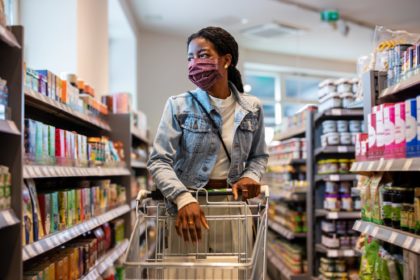
This is the first in a series of articles that TFA will be releasing over the next few months, analyzing trends from our Member Survey.
Though fermentation brands overwhelmingly reported substantial sales gains during the Covid-19 pandemic, they’re not breaking out the champagne. Now, nearing fall 2021, many are starting to see sales flatten. This trend is consistent with sales for the food industry at large, which started to plateau in March 2021.
Most fermenters reported struggles meeting demand — packaging shortages (38%), costly and time-consuming Covid-19 sanitation protocols (30%), distribution delays (29%) and ingredient and labor shortages (both 28%). Then there’s the challenge of keeping a fermented product in stock with constantly changing sales demands.
Jared Schwartz, a TFA Advisory Board member, is founder of fermented sauce producer Poor Devil Pepper Co. and director of operations and quality for Farm Ferments (a facility in Hudson, N.Y., that is home to Hawthorne Valley Farm). He says forecasting has been especially difficult for a refrigerated fermented food with a processing cycle more delicate than that of its shelf-stable counterpart.
“While these spikes in sales are incredible, they also depleted our on-hand WIP [Work-In-Progress],” Schwartz says. He would project barrels of fermenting vegetables to provide adequate inventory for a certain length of time, but peak pandemic demand depleted stock. Finding new ingredients is difficult because everything is sourced locally. “With fermentation, there is of course a much longer lead time on a finished product as the process can’t be rushed. So these challenges left us extending our production season and looking to source from the spot market, which is generally out of our norm. We generally source 95% of our ingredients from New York State and base our projections around the trajectory aforementioned.”
Sales Flatten After Record Year
While predicting sales has been difficult — especially as many states are again increasing Covid-19 restrictions because of the Delta variant — some brand leaders were prepared for a decrease in sales in 2021.
Kheedim Oh, founder of Mama O’s Kimchi (and also on TFA’s Advisory Board), said sales doubled in 2020. But, this summer, they fell dramatically from that peak. “July was terrible,” Oh says, but they “anticipate a boost in the fall since summer months are typically slower.”
Revenue almost tripled in 2020 for hard kombucha brand Dr. Hops, but sales have since started to flatten. The company had secured new distribution before the pandemic, then redesigned their product line this year. “We would have likely done much more… if we had been able to do all the field sales and marketing we had planned,” says Joshua Rood, co-founder and CEO of Dr. Hops Real Hard Kombucha,
Hawthorne Valley is seeing a similar downturn. Sales from March to April spiked about 50%, with overall year-over-year growth at 46%. But “things have definitely plateaued for now,” Schwartz says.
Supply Chain Nightmares
Small packaging supplies — like the tiny plastic caps for glass kombucha bottles — caused huge production issues. Hannah Crum, president of Kombucha Brewers International, says this was the biggest challenge for brewers. “It’s had a massive impact,” she says.
Twenty-four percent of survey respondents said they anticipate production constraints will continue to be a challenge throughout 2021.
And though sales remain strong for Bubbies pickles according to John Gray, owner of Bubbies (and TFA Advisory Board member), “glass shortages have affected the entire industry. Sales are strong, but shortages persist,” as he describes the pandemic’s double-edged sword facing many fermented brands.
Production and distribution issues hit frozen pizza brand Alex’s Awesome Sourdough, too — packaging costs went up 10%, and freight expense nearly doubled. But these didn’t slow the company’s growth. They expanded massively in 2020, from 100 to 1,500 stores. An overall uptick in frozen food sales helped them as well, especially as competing pizza brands went out of stock.
“Sales are strong as pizza is a seasonal category and the end of summer and early fall are the beginning of peak season,” says Alex Corsini, founder of Alex’s Awesome Sourdough (and another TFA Advisory Board member). “We anticipate sales being even stronger if Covid protocols remain strict and restaurants continue operating at a limited capacity. Restaurants definitely take a piece of our pie (pun intended).”
